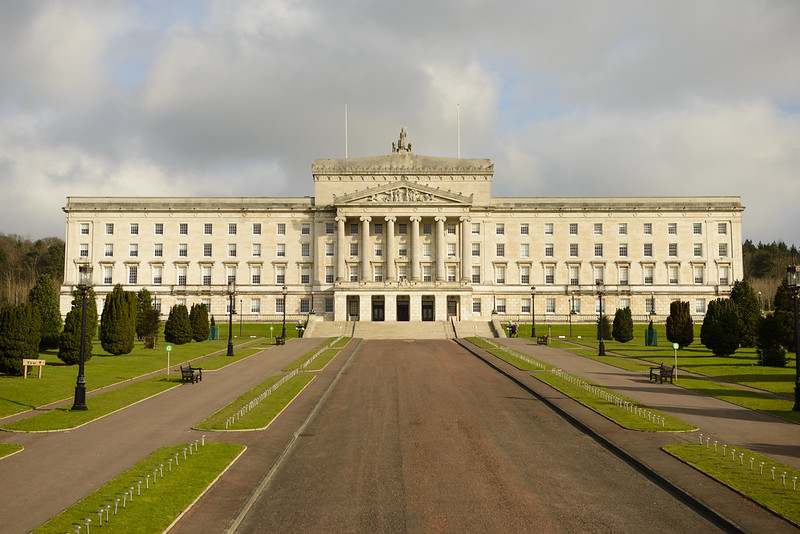(Non-)Religion and Abortion at Stormont
Dr Christopher Raymond looks at the recent debate in the Assembly on the Severe Fetal Impairment Abortion (Amendment) Bill which will likely see the implementation of new restrictions on abortion in Northern Ireland.

While many thought that the issue of abortion in Northern Ireland was settled by Westminster in July 2019, recent debates at Stormont have demonstrated that the issue remains very much alive. With the Severe Fetal Impairment Bill passing its second stage, the implementation of new restrictions on abortion is likely, in part revising last year’s liberalisation. Digging into the details of MLAs’ voting patterns on this bill reveals that another type of religious division beyond that dividing Protestant and Catholic is becoming more salient in NI politics—and will likely become even more so in the years to come.
The bill and the controversy
The contents of the bill working its way through Stormont are brief in text but loom large in their consequences. If it receives assent, the bill will amend the Abortion (Northern Ireland) Regulations 2020 that went into effect in March 2020, prohibiting abortion in cases of severe fetal impairment short of fatal fetal abnormalities. Chief among the conditions that would be prohibited as grounds for termination are abortions involving cases of Down’s Syndrome. Proponents argue that the bill is necessary to prevent discrimination on grounds of disability; opponents argue that the bill undermines women’s healthcare rights.
While the bill was introduced as a Private Members’ Motion by the DUP’s Paul Givan, his bill received support from MLAs from several other parties. Mr Givan noted particular support during debate on the bill from MLAs in the UUP, SDLP, and Alliance.
The bill last Monday evening passed second stage to move on to the health committee, with 48 votes in favour against 12 opposed. Many of the majority’s votes came from the DUP, which formally supported Mr Givan’s bill (Sinn Féin took a formal position of abstaining). The other three parties in the Executive allowed their members a ‘free vote’ in which MLAs could vote with their consciences without the threat of sanctions by their parties. Whether this decision was a reflection of internal divisions among members or not, the results of this division revealed important divisions within each party. All but one of the UUP’s eight MLAs voting on Monday supported the bill, two of the Alliance’s eight MLAs voted in favour of the bill, and a quarter of the SDLP’s twelve MLAs voted against.
MLAs reflecting their constituents’ views?
One of the interesting issues with support for this bill is the degree to which the issue of abortion divides parties along religious versus non-religious lines (beyond the Catholic-Protestant divide). Those MLAs voting against the bill tend to represent constituencies in which fewer residents belong to a religion (Protestant or Catholic) than MLAs who voted in favour of the bill.
Consider, for instance, the divisions within the SDLP. The average share of the constituency that is non-religious among those MLAs who voted in favour of the bill was 3.4 per cent, compared to 6.6 per cent among those who voted against the bill. This suggests that part of the internal division in support for the bill among MLAs reflected differences in opinions on abortion between religious and non-religious voters, with both religiously devout Protestants and Catholics more likely to oppose abortion than non-religious voters.
The degree to which MLAs reflected the broader religious/non-religious divisions in opinion on abortion was particularly strong among those MLAs in constituencies where their party receives few first-preference votes—where MLAs have an incentive to be particularly well-attuned to the views of their constituents lest it cost them in the next election. This may be why MLAs like Andrew Muir representing constituencies with comparatively large non-religious populations voted against the bill (my estimate put the probability of Mr Muir voting in favour of the bill at just 35 per cent). By the same token, this might also explain why MLAs like Patsy McGlone representing constituencies with few non-religious constituents voted in favour (my estimate put the probability of Mr McGlone voting in favour of the bill at 88 per cent).
Implications for politics in Northern Ireland
It is unlikely this will be the last time that topics like abortion surface in Northern Ireland. Opponents of abortion will doubtfully be satisfied with limiting one justification for abortion, while those supporting abortion will doubtlessly resist what they view as infringement on a newly-won right. Debates on issues like this one reflect a broader division that has emerged and become more salient in politics since the Good Friday Agreement between religious voters (both Catholic and Protestant) on the one hand and those who do not identify with religion on the other.
On this and similar issues, it will be interesting to see how the parties respond to the division between religious and non-religious voters that will become increasingly salient as the non-religious share of the population continues to grow. The Alliance Party’s 2019 breakthroughs certainly provide evidence that this secularising trend is already having an impact on elections. Whether secularisation will result in realignment or more episodes of political cooperation between Protestants and Catholics on issues of shared concern remains to be seen.
What is likely to occur is that parties will face internal divisions along religious/non-religious lines like those seen with the Severe Fetal Impairment Bill. Whether they want to address these issues, such divisions may force parties to react and choose a side.
The featured image has been used courtesy of a Creative Commons license.




